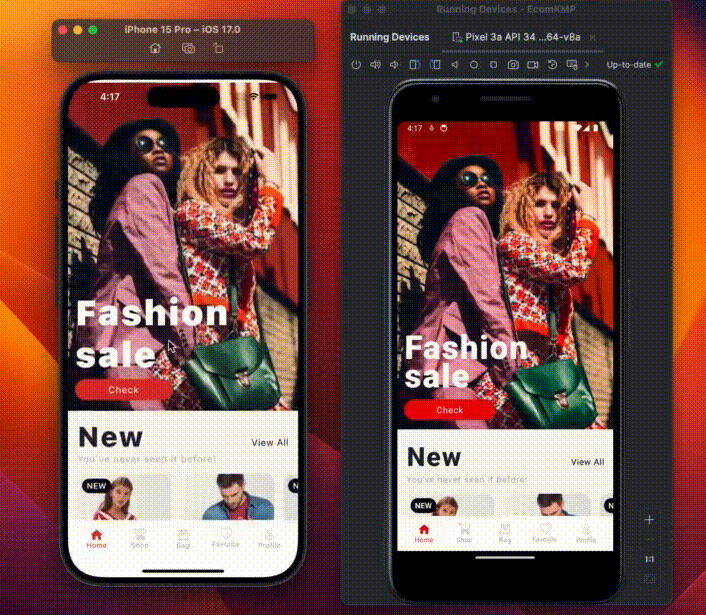E-commerce app built using Compose Multiplatform for Android and iOS

EcomKMP – Multiplatform E-Commerce App
A e-commerce app built using Compose Multiplatform for Android and iOS
⚒️ Architecture
EcomKMP follows the principles of Clean Architecture.
?? Tech stack
| Tools | Link |
|---|---|
| ? Language | Kotlin |
| ? Framework | Compose Multiplatform |
| ? DI | Koin |
| ? Navigation | Tlaster / PreCompose |
| ? Multi-threading | Kotlin Coroutines |
? Video

?️ Screenshots
Android
| Home | Home Scrolled | Shop | Bag | Favorite | Profile |
|---|---|---|---|---|---|
 |
 |
 |
 |
 |
 |
IOS
| Home | Home Scrolled | Shop | Bag | Favorite | Profile |
|---|---|---|---|---|---|
How to run the project? ✅
To run this project, you need the following:
- A machine running a recent version of macOS
- Xcode
- Android Studio
- The Kotlin Multiplatform Mobile plugin
- The CocoaPods dependency manager
Check your environment
Before you start, use the KDoctor tool to ensure that your development environment is configured correctly:
-
Install KDoctor with Homebrew:
brew install kdoctor -
Run KDoctor in your terminal:
kdoctorIf everything is set up correctly, you’ll see valid output:
Environment diagnose (to see all details, use -v option): [✓] Operation System [✓] Java [✓] Android Studio [✓] Xcode [✓] Cocoapods Conclusion: ✓ Your system is ready for Kotlin Multiplatform Mobile development!
Otherwise, KDoctor will highlight which parts of your setup still need to be configured and will suggest a way to fix them.
Understanding the project structure
Open the project in Android Studio and switch the view from Android to Project to see all the files and targets belonging to the project:
Your Compose Multiplatform project includes 3 modules:
shared
This is a Kotlin module that contains the logic common for both Android and iOS applications, that is, the code you share between platforms.
This shared module is also where you’ll write your Compose Multiplatform code.
In shared/src/commonMain/kotlin/App.kt, you can find the shared root @Composable function for your app.
It uses Gradle as the build system. You can add dependencies and change settings in shared/build.gradle.kts.
The shared module builds into an Android library and an iOS framework.
androidApp
This is a Kotlin module that builds into an Android application. It uses Gradle as the build system.
The androidApp module depends on and uses the shared module as a regular Android library.
iosApp
This is an Xcode project that builds into an iOS application.
It depends on and uses the shared module as a CocoaPods dependency.
Run your application
On Android
To run your application on an Android emulator:
- Ensure you have an Android virtual device available. Otherwise, create one.
- In the list of run configurations, select
androidApp. - Choose your virtual device and click Run
On iOS
Running on a simulator
To run your application on an iOS simulator in Android Studio, modify the iosApp run configuration:
- In the list of run configurations, select Edit Configurations
- Navigate to iOS Application | iosApp.
- In the Execution target list, select your target device. Click OK.
- The
iosApprun configuration is now available. Click Run next to your virtual device.
Note Before you continue, we suggest creating a simple “Hello, world!” project in Xcode to ensure you can successfully run apps on your device. You can follow the instructions below or watch this Stanford CS193P lecture recording.
- On the Xcode welcome screen, select Create a new project in Xcode.
- On the iOS tab, choose the App template. Click Next.
- Specify the product name and keep other settings default. Click Next.
- Select where to store the project on your computer and click Create. You’ll see an app that displays “Hello, world!” on the device screen.
- At the top of your Xcode screen, click on the device name near the Run button.
- Plug your device into the computer. You’ll see this device in the list of run options.
- Choose your device and click Run.
Design
Designed by Hitesh Tapaniya. E-Commerce App Design
Find this project useful ? ❤️
- Support it by clicking the ⭐️ button on the upper right of this page. ✌️
License
Copyright 2023 Yugesh Jain
Licensed under the Apache License, Version 2.0 (the "License");
you may not use this file except in compliance with the License.
You may obtain a copy of the License at
http://www.apache.org/licenses/LICENSE-2.0
Unless required by applicable law or agreed to in writing, software
distributed under the License is distributed on an "AS IS" BASIS,
WITHOUT WARRANTIES OR CONDITIONS OF ANY KIND, either express or implied.
See the License for the specific language governing permissions and
limitations under the License.